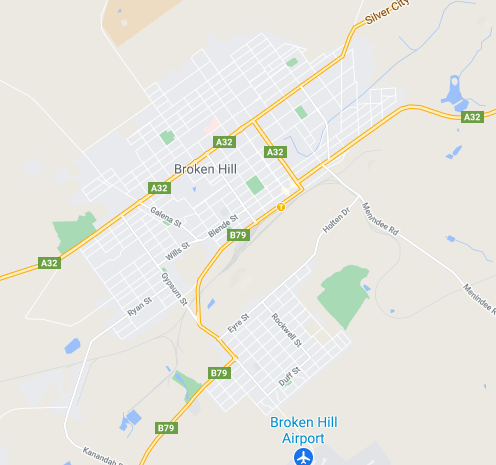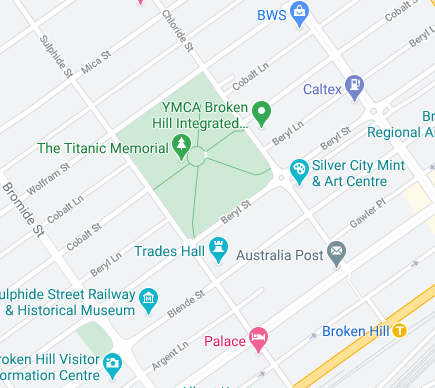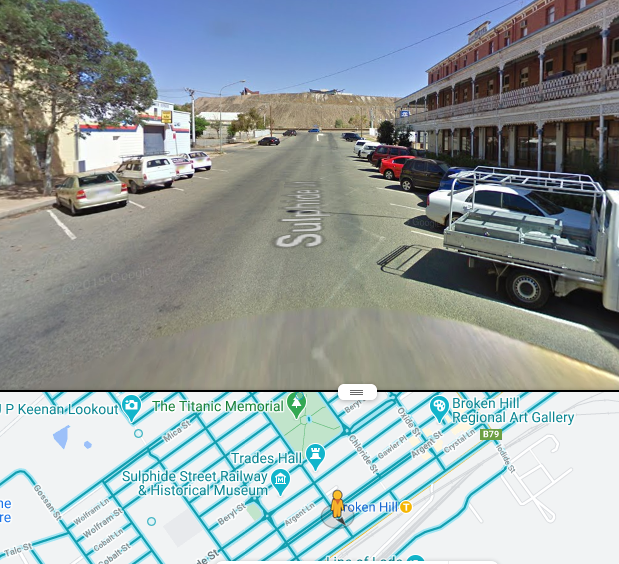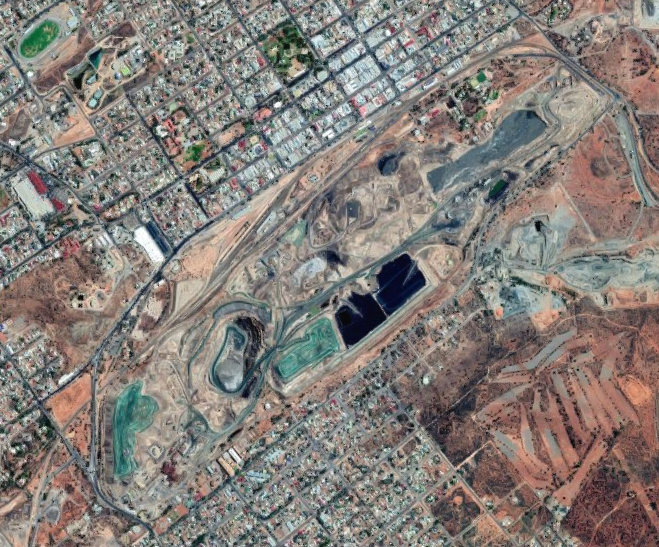MacGyver is a TV character known for finding elegant solutions to problems using whatever items happen to be lying around. Let's see if you can be a mathematical MacGyver. Here is a very pleasant curve which you might know as a sine wave:

You have string, tacks, a compass and straightedge, a candle, a flashlight, a bicycle, a sharp knife, a camera, a roll of paper towels, a party hat, a pencil, paint, wire, lipstick, a live bobcat, and 5 pounds of potato salad. How can you draw a mathematically accurate sine wave?
You are not required to use all the items, but Dr. Shapiro will give creativity points and unrestrained admiration to those who somehow do.
Dr. Shapiro's Solution, Which Is the Least Interesting
 Take one of the cylindrical objects, cut it at an angle, dip it in paint, and roll it on a flat surface as shown at left (here's the source of the GIF). The edge will trace out a sine wave. With a little finesse, the lipstick alone might be all you need.
Take one of the cylindrical objects, cut it at an angle, dip it in paint, and roll it on a flat surface as shown at left (here's the source of the GIF). The edge will trace out a sine wave. With a little finesse, the lipstick alone might be all you need.
Peter M's Solution, Which Is Mostly Like Dr. Shapiro's But Includes Dinner for Two
First, feed the bobcat the potato salad. A bobcat interruption would be quite problematic. Next, you want to eat all the paper towels off the roll (why let them go to waste?) Then, use the knife to cut it at an angle. Find the lowest point on one of the halves and cut straight down (i.e. lengthwise). You now have a stencil which, with your pencil, makes a great utensil for writing sine waves.
Leo S's Solutions, Which Are Plural
- Befriend the bobcat by feeding it potato salad (or if you're a normal person by bonding over your common hatred for it) and scratch its ears (etc) until it is very happy and purring. As cats purr at a consistent frequency and pattern a sine wave will be generated if you can capture it. Jerry rig a chart recorder with wire, a pencil, and a paper towel "sail".
- Simple harmonic motion: Take the string and soak it in the paint. Tie one end to the bicycle's wheel very close but off-center. Anchor the other end down using a tack. Calculate the wavelengths and spin the wheel at close to the right frequency and hopefully, the paint splatter will be a sine wave.
Kate's Solution, Which Uses Everything
Use the sharp knife to cut the cardboard tube inside the roll of paper towels at an angle (so it looks like a cylinder whose top and bottom planes are not parallel). Tie the pencil to the cardboard tube (which has more structural integrity than the full roll of paper towels and is thus likelier not to slip as you're drawing lol) with the string. Draw a straight line on one of the spare paper towels (you need something to draw on!) with the straightedge and roll this weird Frankenstein cylinder so that its center remains on the line. (Push the weird cylinder forward along the line at a constant rate while rotating it, more precisely.) If you start with a paper towel cardboard support thingy of radius r and circumference c, you should, I think, have a sine wave of amplitude r and period c (will check after class). Since a pencil doesn't really show up that well, paint the sine wave to make sure people can see it.
Celebrate your achievement by taking a picture with the camera! Attach the weird cylinder to the bicycle with the tacks and wire, and sate your hunger by sharing a candlelit dinner of potato salad with your pet bobcat. Put on your party hat and your lipstick, turn on your flashlight to navigate, and use the OTHER meaning of the word compass to bike your way home.
Zachary S's Solution, Which "Uses" Everything and Even Has a Title
How Far Can You Be Lost in the Woods?
You jump on your bike, party hat and paper towels under your arm, your friend three towns over promising you potato salad, 5 pounds worth. You wonder if a candle or flashlight is better when using a camera wired to a snowplow. You test it out with a pencil. You've always frightened at the thought of a live bobcat wearing lipstick. You've always known your compass is some degrees off from true north—the straightedge you always forget to bring with you is never helpful anyway. Maybe a few hundred tacks would be easy to avoid if you weren't getting strung along. Maybe a sharp knife would pierce the puzzle amid a pandemic—what is the past few months but a record of persistence? Back on your bike, weary from the long day, you realize you have some control. Yes, you can ride over a puddle-wonderful realization of two or three seasons ago, before a string of bad luck kept you in your home. Today's the time to reflect on what you've done. Today's the day to look behind you, to see the tire tracks, the problem of how to move forward when it is always Tuesday morning, the week never quite coasting downhill. Everything you've left behind has colluded to form an elegant path of your past, mapping your ups and your downs, your zigs and your zags—and that is when you are struck that this signal of your past is not, in fact, a perfect "sine" of tomorrow.
Zachary Z's Solution, Which Involves Literally Herding Cats
- Prepare the paper towel: Build a contraption out of some of the wire that allows the paper towel to roll off the tube similar to a toilet paper dispenser thingy. Unroll the paper and use the straightedge/compass to construct the x- and y-axes using the paint and the lighter grey gridlines using the pencil. Roll it back up when you are finished and use some of the tacks to stick it to the floor.
- Prepare the bicycle: lie the bicycle on its side and build a contraption out of the rest of the wire that holds the lipstick and restrains it to move only in one direction (left-right) while maintaining the position in that direction of a point on the wheel. Attach the contraption to the ground using the other tacks.
- Prepare the bobcat: Cut the string into two parts using your sharp knife. Take one part, wind one end around the rim of the wheel of the bicycle, and tie the other end to the bobcat's tail. Take the other part of the string, tie one end to the open flap on the roll of paper towels, and tie the other end to the bobcat's tail again.
- Position everything: Place the five pounds of potato salad away from the bobcat so that the salad, cat, bike wheel, and paper towels all lie on a straight line with the paper towel roll dispensing parallel to the line and the lipstick constraint perpendicular to the line. Entice the bobcat towards the potato salad by highlighting it with the flashlight.
- Celebrate your hard work: Let the bobcat unroll the paper towel while spinning the bicycle wheel. Et voila! The paper towel roll should now have a sine wave on it, so remove the part of the towel that has it and hold it up. Put on the party hat and take a selfie with the camera for posterity. Then burn the evidence with the candle.
Anna J's Solution, Which Is a Tour de Force
Well, first of all, you tack one end of the string to the ground. You cut it with a knife, of course, the sharp one. You tie the other end of the string to the pencil, and use it to trace a circle on the ground. Now, use the compass and straightedge to draw a bunch of circles, all with the same radius, along the big circle that you traced. These circles should be about a foot or so in diameter. By now, you've worked hard all day, and it's night. You should throw a party for your hard work, which is why you need the party hat. You'll also want to put some lipstick on, just because you're having fun here. You're hungry too, so you eat some of the potato salad. Not all of it, because you'll need more of it later. Now back to work. You have a lot of tacks, so line them on the outside of the small circles that you drew. Make them pretty close to each other. By the way, it's still night, so you have to be using the flashlight to make this happen. You've still got that live bobcat, right? Don't let it escape! Tie some of that wire around its neck, as a leash. Now put the cat in that narrow row between the tacks. Oh, look at that, the flashlight ran out of batteries and it's still dark. Light that candle! We're almost done here. Tie the bobcat to the ground, so that it can't move while you work. Now, take your paper towels. Use the knife, or tacks if you prefer, to stab a bunch of tiny holes in the paper towel. Now, yank all the paper towels off of the roll and lay them side by side. Split it up into four strips, that are all equal length. Put them side by side, and then tie them together so that now you have a paper towel sheet that's four paper towel lengths long on one side, and as long as it can be on the other side. Tie it to bike. The candle just ran out, but that's fine, because you are seriously so close to being done. Now, as everyone knows, bobcats are huge fans of potato salad. So what you're going to do now is open the lids of both slightly, then tie them together. Put some of the potato salad around in the circle, then tie the paint, potato salad combo to the bobcat. Set the camera up, and take a video. Something might go wrong, like the bobcat stepping in the paint, so you'll want to take a video for further research, and to see what actually happened. This part is going to be hard, so are you ready? Untie the bobcat, now run to your bike. FASTER! Now get on your bike and bike straight away from your tacky circle as smoothly as you can, no changing your speed! Now, the bobcat should be running in the circle, eating up all the potato salad, and because you're moving the paper towels, it is drawing your sine wave. If you want to do math, you can do this again, and use your camera video to see how fast the bobcat was running to see exactly how fast you need to bike. And that should give you a perfect sine wave!
Congratulations to yesterday's solvers. I hope you had as much fun reading the solutions as I did!





 Take one of the cylindrical objects, cut it at an angle, dip it in paint, and roll it on a flat surface as shown at left (
Take one of the cylindrical objects, cut it at an angle, dip it in paint, and roll it on a flat surface as shown at left (